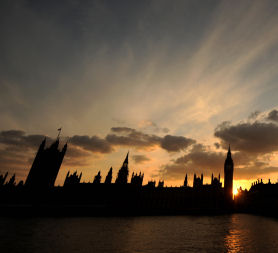Smaller parties eye up benefits of hung parliament
Updated on 20 April 2010
As the opinion polls tighten and suggest a growing likelihood of a hung parliament, Gaby Hinsliff writes for Channel 4 News about how smaller parties are spotting a golden opportunity.

It's official: Westminster is now gripped by hung parliament fever. But while all eyes are on the Liberal Democrats in their potential role as kingmakers, there is another wild card that shouldn't be overlooked if nobody gets a clear majority in May. And it's one that may affect the pattern of future spending cuts.
The smaller parties have spotted a once-in-a-generation chance, if not to join formal coalitions then certainly to cut some sweetheart deals in return for helping a fragile coalition government get key legislation through.
This morning, SNP leader Alex Salmond used his manifesto launch to spell out his experience with coalition working in Scotland: a discreet reminder to any party lacking a working majority.
His party is targeting a potentially useful 20 seats, although polls suggest it is struggling to make headway.
Meanwhile DUP leader Peter Robinson was blunt yesterday about his party's willingness to use the situation for leverage, noting "unprecedented opportunities for a focused, cohesive unionist bloc" in a hung parliament.
The DUP, which is targeting 10 seats this time, is pragmatic about its partnerships and famous for driving hard bargains: it propped John Major up against Conservative rebels in the 1990s but also saved Labour from defeat over anti-terrorism legislation two years ago.
Others potentially in the mix include Plaid Cymru, which had three MPs in the last parliament: and possibly even the Greens and UKIP, if they gain their first parliamentary seats this time.
While the SNP, Plaid Cymru and the Greens are all naturally inclined towards leftwing alliances and the unionists and UKIP towards the right, the realpolitik of bargaining for power can sometimes produce surprise alliances.
So what will the smaller parties' price be? One obvious demand is electoral reform, although differing opinions between parties on the precise preferred option suggests an arcane argument over which variant might dominate early negotiations.
But the crunch issue could be public spending cuts. Salmond's manifesto pledges to protect Scottish public services from cuts by what he calls "London-based parties", while Robinson promised to use any influence gained from a hung parliament to further Northern Ireland's interests.
And that could make the already fraught process of cutting the deficit even harder: if spending in some regions can't be chopped thanks to pork barrel politics, other parts of the UK may bear a bigger brunt.
It would be surprising if Salmond didn't seek, in any negotiations, to protect the generous terms of the Barnett formula governing spending in Scotland - which both main parties have been eyeing up.
The SNP and Greens also, like the Lib Dems, favour scrapping Trident to save money.
Meanwhile David Cameron has said he regards Wales as the 'poor relation' under Barnett. Could the Tories even attempt a deal with Plaid over a better settlement for Cardiff?
What will make any negotiations spicier is that - thanks to devolution in Scotland, Wales, Northern Ireland and London - the smaller parties are now old hands at coalition politics, and particularly at playing one side off against the other. The SNP's manifesto, for example, pledges not to enter any coalition in a hung parliament, but to tackle every issue on a case by case basis.
It remains to be seen whether the two main party leaders are as pragmatic. What would it take for Gordon Brown to bury the hatchet with the auld enemy - or for David Cameron to woo UKIP's Nigel Farage, if he's elected? We may soon find out.









